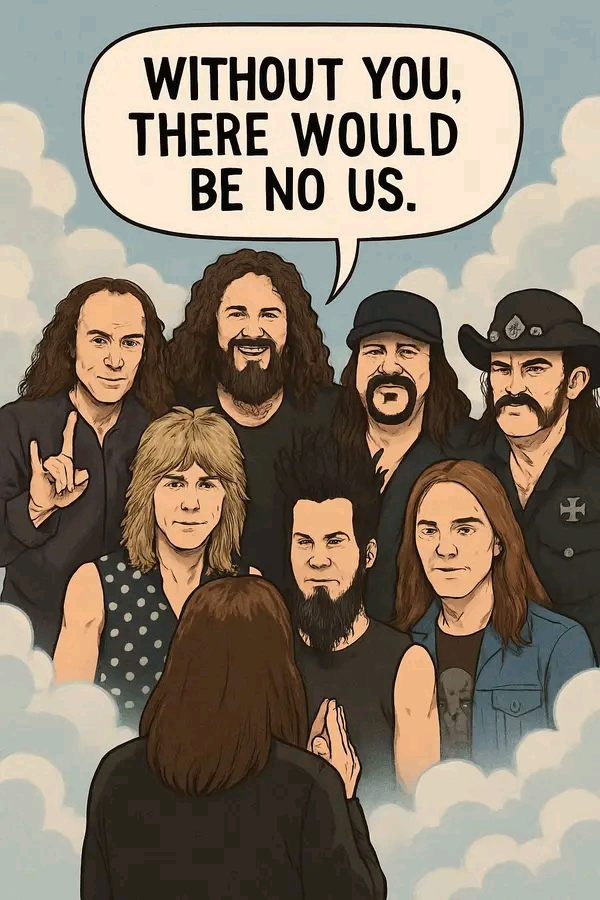Ozzy Osbourne: Son of Heaven – May God Accept Your Soul
The world stood still the day the news broke: *John Michael “Ozzy” Osbourne*, the Prince of Darkness, the wild child of rock ‘n’ roll, had passed on. For many, it felt as though a piece of history—a piece of themselves—had died with him. Streets across the globe were filled with candlelight vigils, from Birmingham to Buenos Aires, Tokyo to Los Angeles. Tributes poured in, not only from rock legends and pop stars but from everyday fans who had been touched by the voice, the madness, and the humanity of Ozzy Osbourne.
Ozzy’s story was never just about the music. It was about survival. It was about transformation.
Born in Aston, Birmingham, in 1948, Ozzy rose from the ashes of working-class struggle and personal chaos to become one of the most recognizable and influential figures in music history. When Black Sabbath emerged in 1968, no one could have foreseen how deeply they would change the course of rock. Their heavy riffs, ominous lyrics, and Ozzy’s haunting vocals created a genre: heavy metal. And it was Ozzy’s voice that pierced the veil of ordinary life, screaming out against war, addiction, and the shadows that haunt the human condition.
He was more than a frontman; he was a prophet in leather and eyeliner.
Despite the controversies, the mistakes, and the public battles with addiction, Ozzy never stopped fighting. His journey was painfully human—he stumbled, he fell, he rose again. And in that way, he became something of a spiritual figure for those who also walked through darkness. To his fans, he was more than a rock star. He was someone who’d seen the abyss and still found a way to sing.
Through the decades, Ozzy evolved. His solo career brought unforgettable anthems like *Crazy Train*, *Mr. Crowley*, and *No More Tears*. His partnership with guitarist Randy Rhoads was lightning in a bottle—two creative forces colliding to bring beauty to chaos. The tragic loss of Rhoads could have broken Ozzy, but somehow, he endured.
And then came *The Osbournes*. The reality show that no one saw coming. It showed us a different side of the so-called Prince of Darkness: the dad in fuzzy slippers, the confused man swearing at remote controls, the loving husband of Sharon Osbourne. The world saw behind the curtain, and instead of a myth, we saw a man. And we loved him even more.
Ozzy became a symbol of defiant vulnerability—someone unafraid to show the cracks in his armor. He became, paradoxically, both a god of rock and a deeply relatable human being.
In his final years, despite numerous health struggles, Ozzy kept reaching for the microphone. He said he’d die onstage if he had to. But even when he could no longer tour, he remained present. His music never stopped playing. His voice—gravelly, unmistakable—remained a comfort for millions.
So when the news of his passing came, the world did not just mourn a musician. We mourned a spiritual guide, an accidental shaman, a voice that had carried us through our own darkest nights.
A private ceremony was held in Birmingham Cathedral, where close friends and family gathered to pay their respects. The stained-glass windows flickered in the late afternoon light, casting rainbow halos across the oak pews. Sharon sat at the front, her hands folded over a small black rose. Kelly and Jack stood nearby, quietly holding onto each other.
The ceremony was full of music, as it should be. *Changes*, the duet with his daughter Kelly, played softly as people entered. Later, Tony Iommi and Geezer Butler took the stage for a stripped-down rendition of *Planet Caravan*, and there wasn’t a dry eye in the room. At the end, they played *See You on the Other Side*, and the entire room stood in silence.
As the service ended, a white dove was released into the sky—a quiet nod to the infamous moment at a record-label meeting decades earlier when Ozzy bit the head off a dove. This time, the bird flew free, a symbol of peace, redemption, and perhaps, the soul of a man finally at rest.
Outside, thousands had gathered. They wore leather jackets and Sabbath shirts. They held candles and signs. Some wept openly; others raised their fists to the sky. An impromptu chant began to rise: “*We love you, Ozzy!*” over and over, like a sacred mantra. Somewhere in the crowd, a young girl with blue hair held up a sign: *Son of Heaven – Rock On Forever.*
And maybe that’s what Ozzy had become—a son of heaven. Not in the angelic sense, but in the mythic sense. A man forged in fire, hammered by life, and refined into something immortal. A flawed saint of sound and fury.
In the days following, murals went up around the world. Massive paintings of Ozzy with wings, guitar in hand, looking down with that familiar mischievous grin. Music festivals were renamed. Charity concerts were held in his honor. And in the UK Parliament, a motion was passed to create a national holiday recognizing his contributions to music and culture.
But perhaps the most touching tribute came from a small record shop in Birmingham. In its window, they placed a single, handwritten note beneath a Black Sabbath vinyl:
*He gave us the soundtrack to our rebellion, the rhythm to our rage, and the hope that even the broken can rise. Rest in peace, Ozzy. Son of Heaven. You’ll never be forgotten.*
Now, somewhere beyond the veil, one can imagine Ozzy—cane in hand, sunglasses on, stumbling through the gates of Heaven.
“Bloody hell, I made it,” he mutters with a grin.
And God, surely smiling, says: “Welcome home, my son.”









